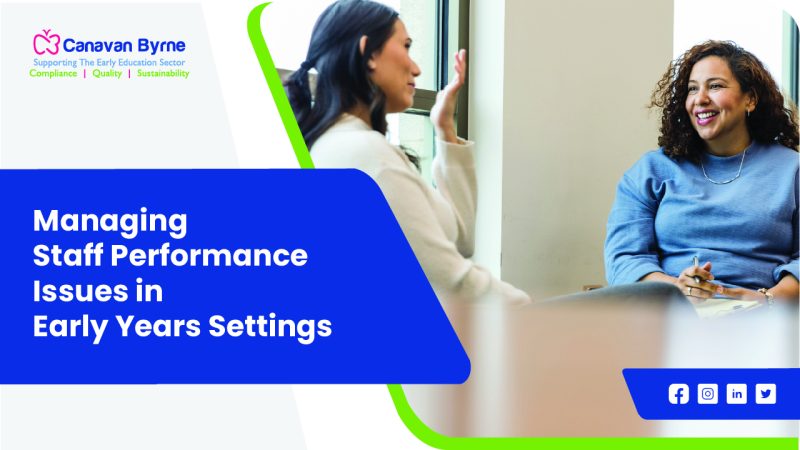
Managing staff performance issues in Early Years settings :
1. Establish Clear Expectations
- Clearly defined roles, expectations, and performance standards are essential. Ensure all staff have a job description that outlines their responsibilities and key performance indicators (KPIs) that reflect the expected standards of care and education.
- Regularly revisit these expectations, especially during onboarding, and provide updates when policies change.
2. Provide Continuous Feedback and Support
- Schedule regular one-on-one meetings to discuss both strengths and areas for improvement. Constructive feedback helps staff understand areas needing growth without feeling punitive.
- Encourage open communication so employees feel safe discussing any challenges they’re facing, which can often be addressed with training or additional resources.
3. Implement Professional Development Plans
- Design individualised development plans to support staff growth. Include training in child development, health and safety, communication skills, and other relevant areas.
- Early years staff often benefit from practical workshops or courses on child behaviour management, communication, and teamwork. Development plans should also reflect career advancement opportunities within the setting.
4. Monitor Performance Regularly
- Use structured observation and regular performance reviews to evaluate staff objectively. In Early Years settings, these reviews should include direct observation of interactions with children and engagement in daily routines.
- Documentation, such as observation notes and checklists, can help track progress over time and serve as a foundation for discussion during reviews.
5. Address Issues Promptly and Professionally
- Handle performance concerns as soon as they arise to prevent them from escalating. Begin with an informal conversation to understand the issue from the employee’s perspective.
- For ongoing issues, follow a structured process that includes a clear outline of concerns, a set timeframe for improvement, and scheduled follow-up meetings to assess progress.
6. Encourage a Positive, Supportive Environment
- Cultivate a culture that values teamwork, respect, and constructive feedback. A supportive atmosphere can motivate staff to perform at their best and feel confident seeking help when challenges arise.
- Recognise and celebrate successes, both individually and as a team, to promote morale and engagement.
7. Implement Formal Performance Improvement Plans (PIPs) if Necessary
- If informal measures don’t yield results, develop a Performance Improvement Plan. A PIP should outline specific improvement targets, support resources, and a timeline.
- Regularly review progress and provide feedback during the PIP period. If performance remains below expectations, a more formal HR process may be necessary.
8. Maintain Documentation
- Keep thorough records of performance discussions, feedback, and any interventions provided. Documentation is so important for both ongoing support and, if needed, formal disciplinary procedures.
9. Understand Compliance and Legal Requirements
- Be aware of legislation, early years regulations, and other compliance requirements that apply to the sector. Early Years staff have specific duties and standards they must meet to ensure child safety and development, so aligning performance expectations with regulatory guidelines is crucial.
If you would like more information about our services
or if we can help you with any questions or queries,
please call us at:
(+353) 1-623-5908 or email us at eys@canavanbyrne.ie.




